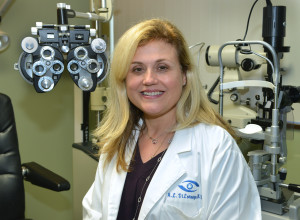This article is part of the LBN Eye Care Series
Photos by Vaughn Gurganian
As a young Canadian medical student who dreamed of working surgically with her hands and helping cancer patients of all ages, Troy ophthalmologist Dr. A. Luisa Di Lorenzo of Somerset Ophthalmology began her oncology rotation at The Royal College of Surgeons in Ireland with eager anticipation.
But as the program progressed – and she learned that, as an oncologist, she wouldn’t be doing surgery and would need to choose between adults and children as patients – Di Lorenzo wondered if oncology was truly the best specialty field for her.
“Fortuitously,” says Dr. Di Lorenzo, “in my final year of medical school, my rotation in ophthalmology at Royal Victoria Eye and Ear Hospital in Dublin, Ireland, was with larger-than-life Professor Louis Collum. During my very first day with him, I saw that he cared for children as well as adults – and he performed surgeries, too. And when, with photos of the inside of eyes, he innovatively taught us that all diseases can affect the eyes, I knew by the end of that first day that I wanted to become an ophthalmologist.”
Having completed an Internal Medicine Residency at Wayne State University and an Ophthalmology Residency at the Kresge Eye Institute of Wayne State University, serving as Chief Resident in her last year, Dr. Di Lorenzo established Somerset Ophthalmology in Troy.
Di Lorenzo explains some of the almost science fiction-like improvements in the field that she has seen and passionately incorporated into her practice of eighteen years.
“Cataract surgery has changed tremendously,” Dr. Di Lorenzo says, “with extremely small incisions and ‘no-stitch’ techniques. Implant lenses are tiny, and anesthesia is now topical instead of being injected around the eyeball. Patients who may be on blood thinners no longer have to stop them.”
The lenses implanted during cataract procedures have also improved dramatically, along with methods for more precise measurements in calculating the appropriate strength of the lens. In the last ten years, inter-ocular lenses have been developed that can correct astigmatism and offer multi-focal and accommodative vision, often allowing patients to forego reading glasses.
Many eye patients dread a diagnosis of macular degeneration which, in the past, has often meant certain loss of clear sight. Dr. Di Lorenzo, who also teaches at Oakland University and Wayne State University medical schools, is thrilled that people with macular degeneration now have vastly improved chances of maintaining – and sometimes even improving – their vision. “There’s been a major treatment development since 2004 for patients with “wet” macular degeneration, in which blood builds up behind the retina, consisting of special intra-ocular injections.”
And the doctor is very excited about recent research of “dry” macular degeneration. “AREDS (Age-Related Eye Disease Studies),” she said, “found that ingesting nutrients such as lutein, zinc and others in leafy green vegetables not only can halt ongoing deterioration – but can offer condition improvement! Over-the-counter ocular supplements are valuable, and I do recommend them to my patients.”
The doctor has additional recommendations for eye health and safety. “Don’t smoke!” she states. “Smoking is a great risk factor for eye disease. And wear protective eyewear for sports and industrial work of any kind. So many children have eye injuries from soccer balls, etc., hitting unprotected eyes. And I do recommend that children see an ophthalmologist who, with their scope of training, can often spot lazy eye, tumors, neurological and other issues during examinations.”
“Interestingly,” she adds, “exercise is great for vision health. Also, wear sunglasses in bright light. And eat those leafy, green vegetables!”
Dr. Di Lorenzo and her associate, Dr. Sue Lim, do believe in a “total body” approach and, in their personalized and compassionate practice, they treat their patients – children and adults – like family. “It’s easy to make treatment decisions when you feel that way,” the doctor says. “We are available all the time. We love what we do.”
And, where outside the walls of her practice, Di Lorenzo zealously pursues new surgical techniques and knowledge, she also is active with the American Academy of Ophthalmology, the Michigan State Medical Society and the Michigan Society of Eye Physicians and Surgeons (serving as its president in 2010). In rare leisure time she enjoys acting, music, all types of athletics, entertaining, traveling and being with her husband, an internist.
But, with everything that she does, Dr. Di Lorenzo’s true focus is stated as a quote on their website (somersetophthalmology.com): “The beauty of life is in the details.”
And, she wants us to be able to see all of them.
Somerset Ophthalmology
2877 Crooks Rd. Suite B
Troy, MI 48084
248.822.7003



Recent Comments